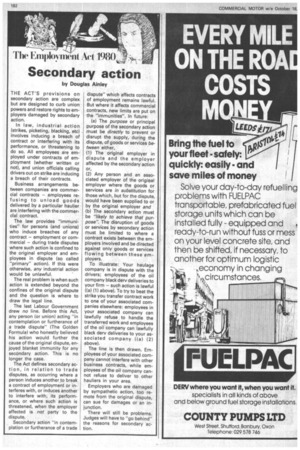The Employment At 1980, 4
Page 184

If you've noticed an error in this article please click here to report it so we can fix it.
Secondary action
by Douglas Ainley THE ACT'S provisions on secondary action are complex but are designed to curb union powers and restore rights to employers damaged by secondary action.
In law, industrial action (strikes, picketing, blacking, etc) involves inducing a breach of contract or interfering with its performance, or threatening to do so. All employees are employed under contracts of employment (whether written or not), and union officials calling drivers out on strike are inducing a breach of their contracts.
Business arrangements between companies are commercial contracts — employees refusing to unload goods delivered by a particular haulier are interfering with the commercial contract.
The law provides "immunities" for persons (and unions) who induce breaches of any contract — employment or commercial — during trade disputes where such action is confined to the original employer and employees in dispute (so called "primary" action). If this were otherwise, any industrial action would be unlawful.
The real problem is when such action is extended beyond the confines of the original dispute and the question is where to draw the legal line.
The last Labour Government drew no line. Before this Act, any person (or union) acting "in contemplation or furtherance of a trade dispute" (The Golden Formula) who honestly believed his action would further the cause of the original dispute, enjoyed blanket immunity for any secondary action. This is no longer the case.
The Act defines secondary action, in relation to trade disputes, as occurring where a person induces another to break a contract of employment or interferes with, or induces another to interfere with, its performance, or where such action is threatened, when the employer affected is not party to the dispute.
Secondary action "in contemplation or furtherance of a trade dispute" which affects contracts of employment remains lawful. But where it affects commercial contracts, new limits are put on the "immunities". In future:
(a) The purpose or principal purpose of the secondary action must be directly to prevent or disrupt the supply, during the dispute, of goods or services between either,
(1) The original employer in dispute and the employer affected by the secondary action
Or,
(2) Any person and an associated employer of the origirfial employer where the goods or services are in substitution for those which, but for the dispute, would have been supplied to or by the original employer and (b) The secondary action must be "likely to achieve that purpose". The disruption of goods or services by secondary action must be limited to where a contract exists between the employers involved and be directed against only goods or services flowing between these employers.
To illustrate: Your haulage company is in dispute with the drivers; employees of the oil company black dery deliveries to your firm — such action is lawful ((a) (1) above). To try to beat the strike you transfer contract work to one of your associated companies elsewhere: employees in your associated company can lawfully refuse . to handle the transferred work and employees of the oil company can lawfully black dery deliveries to your associated company ((a) (2) above).
The line is then drawn. Employees of your associated company cannot interfere with other business contracts, while employees of the oil company cannot refuse to deliver to other hauliers in your area.
Employers who are damaged by sympathetic action, too remote from the original dispute, can sue for damages or an injunction.
There will still be problems. Judges will have to "go behind" the reasons for secondary action.




























































































































































































































































































